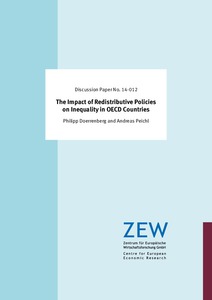The impact of redistributive policies on inequality in OECD countries
"Due to behavioral effects triggered by redistributional interventions, it is still an open question whether government policies are able to effectively reduce income inequality. We contribute to this research question by using different country-level data sources to study inequality trends in...
| Main Authors: | , |
|---|---|
| Institution: | ETUI-European Trade Union Institute |
| Format: | TEXT |
| Language: | English |
| Published: |
Mannheim
2014
ZEW |
| Subjects: | |
| Online Access: | https://www.labourline.org/KENTIKA-19110273124919384559-The-impact-of-redistributive-p.htm |
| Summary: | "Due to behavioral effects triggered by redistributional interventions, it is still an open question whether government policies are able to effectively reduce income inequality. We contribute to this research question by using different country-level data sources to study inequality trends in OECD countries since 1980. We first investigate the development of inequality over time before analyzing the question of whether governments can effectively reduce inequality. Different identication strategies, using fixed effects and instrumental variables models, provide some evidence that governments are capable of reducing income inequality despite countervailing behavioral responses. The effect is stronger for social expenditure policies than for progressive taxation." |
|---|---|
| Physical Description: | 33 p. Digital |

